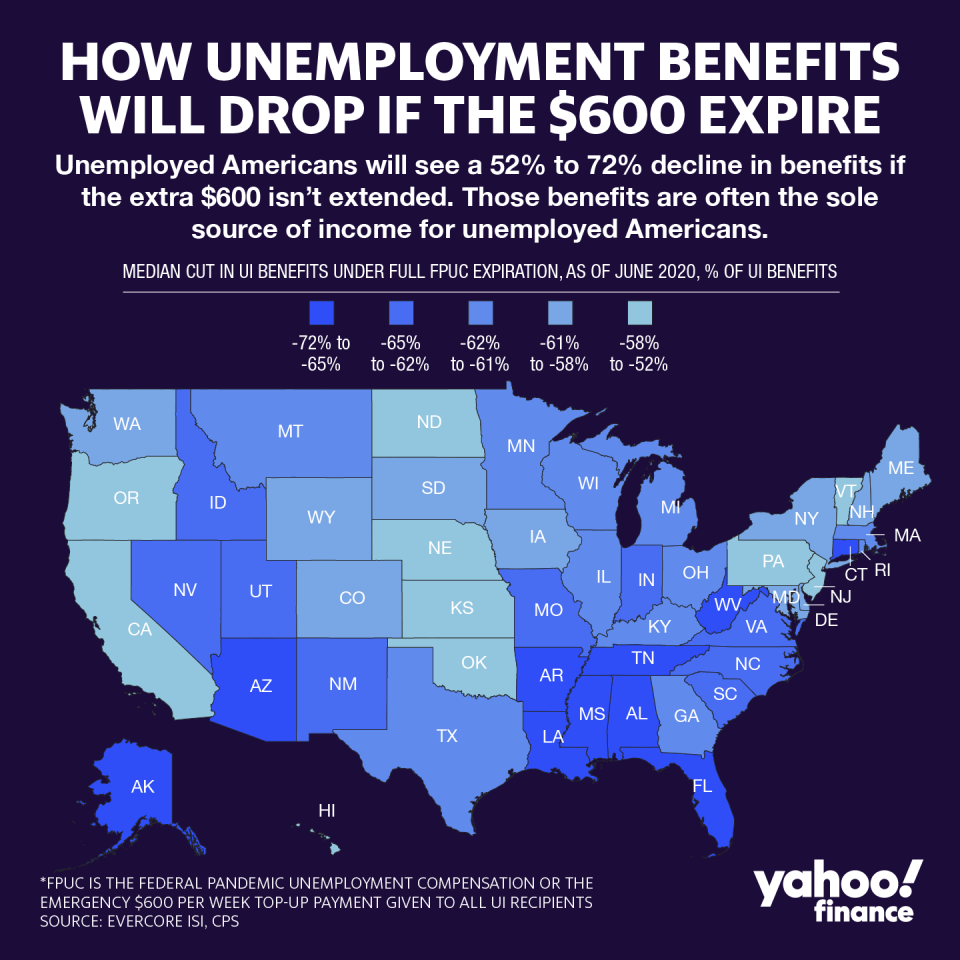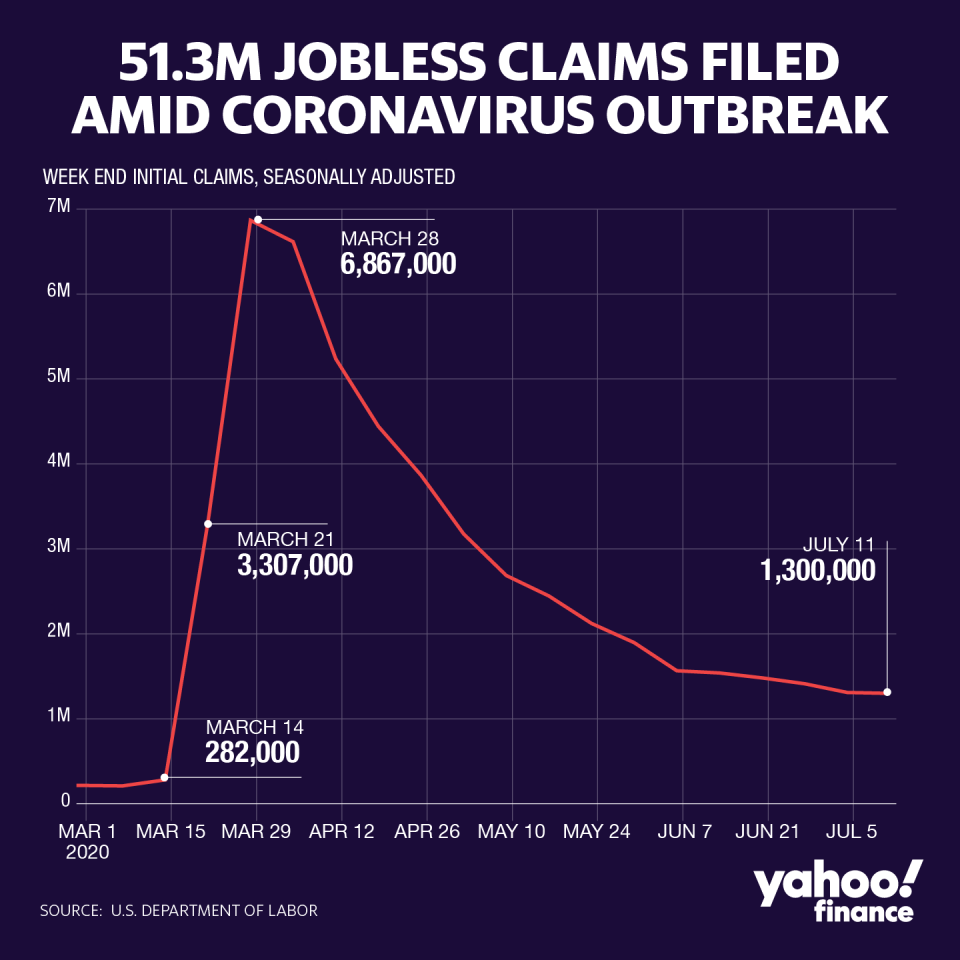'Nobody can survive on that': Jobless Americans fear end of extra unemployment insurance
Steven Berr, jobless since March, is dreading what the end of July will bring: His income will drop to just a quarter of what it is now when critical unemployment aid from the government runs out.
“We're talking about $900 a month. Nobody can survive on that,” Berr, 57, said. “My rent is $2,200. After August, paying my bills and my rent will be almost impossible.”
Berr is among the millions of unemployed Americans who rely on the additional $600 in weekly unemployment benefits provided under the CARES Act. The relief is set to expire on July 31, and without that support, many Americans will see their incomes plummet by half or more, making it increasingly difficult to pay their bills, according to a new analysis.
“Imagine waking up and making half to a quarter of what you made the day before,” said Ernie Tedeschi, a managing director and policy economist for Evercore ISI. “That's what unemployed workers are facing on July 31.”

‘It's like a self-inflicted recession’
The median decrease in unemployment benefits after the expiration would range from 52% to 72%, according to an analysis by Evercore ISI provided to Yahoo Money. Those unemployment benefits are often the only source of income for jobless Americans, leading to a huge hit on their incomes, Tedeschi said.
“It's like a self-inflicted recession,” he said. “You would have to look at recessions to see drops in income that sharp, happening so fast.”
Unemployed Americans in Arizona, Louisiana and Mississippi will experience the largest reductions in benefits with median declines of 71%, 71%, and 72%, respectively. Those also happen to be states where coronavirus cases have been growing in the last few weeks.
“We have it entirely backwards now,” Tedeschi said. “The point of this emergency unemployment insurance was to keep families whole at a time when there was this external threat to the economy, namely the virus. And if the virus is re-surging, then that should be a reason to extend unemployment.”

That’s why Berr needs the benefits, which have allowed him to stay home and isolate. He was a full-time driver at a ride-share company, but stopped working at the end of March because he’s at a high risk to develop a severe illness if he contracts COVID-19. He has asthma, hypertension, and underwent heart surgery when he was a child.
He also thinks about his three children: his 18- and 21-years-old sons who live with him in Danbury, Connecticut and his 24-year-old daughter who is in Boston.
“My wife passed away a year and a half ago,” Berr said. “My concern is as much for my own health as it is that I don't want to do something that might leave my kids without any parents.”
‘I am just not gonna make it’
This week, 1.3 million Americans filed for unemployment benefits for the first time, and 17.3 million workers continued to receive benefits because they haven’t found a job.
While initial claims are vastly lower than at their peak in March with 6.9 million filings in one week, the number of claims has leveled out between 1 million and 2 million in the last seven weeks, still a historically high level.

“Here we are in July,” Tedeschi said, “and we're still getting 1.5 million people applying for the first time right now.”
Read more: Do you have to pay taxes on unemployment benefits?
Take Cindy Kolze in Fremont, California. She started getting unemployment benefits in July after she stopped working as a flight attendant. More than 90% of her monthly income is now coming from the unemployment benefits.
While the unemployment benefits aren’t “even close” to what she normally earns — even with the extra $600 — it’s enough to help pay her bills. At the end of July, that income will be cut in half.
“I am just not gonna make it. I mean, I'm not going to make it,” Kolze, 62, said. “I’m on my own when it comes to paying my bills. With the amount of money that I am going to be bringing in without that $600, I will not be able to live.”
‘At least for a few weeks, these payments will lapse’
While it seems less likely that Congress will extend the full $600-a-week aid, the possibility of reduced additional unemployment benefits — like an extra $300 a week — remains on the table.

“That's better than it all going away,” Tedeschi said. “But that still means that unemployed workers would wake up after July 31 and their income would be one-quarter to one-third smaller overnight.”
Read more: Coronavirus: How to find a job after a layoff
Another concern is timing. If extended, the unemployment benefits still may take time to hit Americans’ wallets since Congress is currently in recess and doesn’t return to decide the fate of coronavirus relief until July 20. The benefits could expire before another stimulus plan is drawn up, approved, and sent to the president for his signature.
“If they wait until July 31, we're already gonna be past the point where people have lost emergency unemployment insurance benefits,” Tedeschi said. “As a result — at least for a few weeks — these payments will lapse and that's going to make it hard on these families.”
Denitsa is a writer for Yahoo Finance and Cashay, a new personal finance website. Follow her on Twitter @denitsa_tsekova.
Read more:
Rich Americans' pullback in spending is hurting the economic recovery
Remote schooling leads to a 'shocking' disparity between rich and poor students
Read more personal finance information, news, and tips on Cashay
Follow Yahoo Finance on Twitter, Facebook, Instagram, Flipboard, SmartNews, LinkedIn, YouTube, and Reddit.

 money
money 

